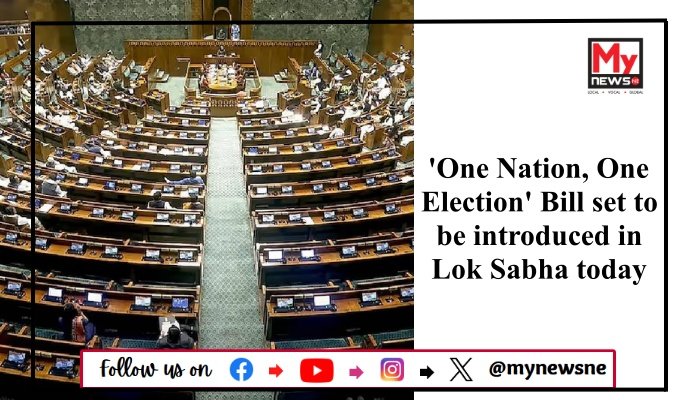Government to Table Constitution (129th Amendment) Bill for ‘One Nation, One Election’ in Lok Sabha
New Delhi: Union Law and Justice Minister Arjun Ram Meghwal is set to present the Constitution (129th Amendment) Bill, 2024, in the Lok Sabha today, a landmark legislation proposing the ambitious ‘One Nation, One Election’ framework. The bill seeks to synchronize elections for the Lok Sabha and all state assemblies, fundamentally transforming India’s electoral process.
The government’s move aligns with its vision of reducing the financial and administrative burden caused by staggered elections across the country. In addition to this proposal, Meghwal will table key amendments to existing laws, including the Government of Union Territories Act, 1963, the Government of National Capital Territory of Delhi Act, 1991, and the Jammu and Kashmir Reorganisation Act, 2019. These amendments aim to align elections in Delhi, Jammu & Kashmir, and Puducherry with the broader simultaneous election plan.
The bill is a direct outcome of recommendations made by the High-Level Committee on Simultaneous Elections, chaired by former President Ram Nath Kovind. Approved by the Union Cabinet in September, the committee’s report advocates a two-phase approach to implement the initiative. The first phase will combine Lok Sabha and state assembly elections, while the second phase proposes holding **local body elections—panchayat and municipal polls—within 100 days of the general elections. To ensure consistency and efficiency, the committee has also suggested a unified electoral roll to be used across all levels of elections.
The proposal has ignited significant political debate. Parties within the BJP-led NDA alliance have welcomed the bill, lauding its potential to reduce election costs, minimize administrative disruption, and enhance governance efficiency. However, several opposition parties under the INDIA bloc have expressed strong reservations. Critics argue that the reform could undermine federalism and disproportionately impact regional political dynamics.
As the bill is introduced in the Lok Sabha today, the session is expected to witness intense discussions and sharp exchanges. The government remains determined to push forward this transformative reform, describing it as a necessary step to streamline the electoral process and strengthen India’s democratic framework. Meanwhile, the opposition has vowed to challenge the bill, ensuring a heated debate on what could be one of the most significant legislative reforms in recent history.
Read More: Sikkim: New Governing Body of All Sikkimese Bhutia Association Takes Oath

